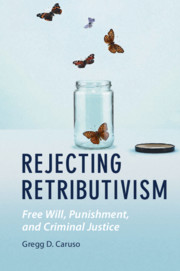Crossref Citations
This Book has been
cited by the following publications. This list is generated based on data provided by Crossref.
Boudry, Maarten
2021.
Do free will skeptics swallow their own medicine?.
Metascience,
Vol. 30,
Issue. 3,
p.
365.
Pereboom, Derk
2021.
Undivided Forward-Looking Moral Responsibility.
The Monist,
Vol. 104,
Issue. 4,
p.
484.
Gogoshin, Dane Leigh
2021.
Robot Responsibility and Moral Community.
Frontiers in Robotics and AI,
Vol. 8,
Issue. ,
Menges, Leonhard
2021.
The Kind of Blame Skeptics Should Be Skeptical About.
Canadian Journal of Philosophy,
Vol. 51,
Issue. 6,
p.
401.
Webber, Michael
2022.
Marx as a guide for a critical geographer.
Human Geography,
Vol. 15,
Issue. 1,
p.
73.
Marshall, Julia
and
McAuliffe, Katherine
2022.
Children as assessors and agents of third-party punishment.
Nature Reviews Psychology,
Vol. 1,
Issue. 6,
p.
334.
Caruso, Gregg D.
and
Pereboom, Derk
2022.
Moral Responsibility Reconsidered.
Tillson, John
2022.
Rationality, Religious Belief, and Shaping Dispositions: Replies to Carruth, Gatley, Levy, Kotzee and Rocha.
Studies in Philosophy and Education,
Vol. 41,
Issue. 1,
p.
135.
Danaher, John
2022.
Tragic Choices and the Virtue of Techno-Responsibility Gaps.
Philosophy & Technology,
Vol. 35,
Issue. 2,
Hoskins, Zachary
2022.
Public Reason and the Justification of Punishment.
Criminal Justice Ethics,
Vol. 41,
Issue. 2,
p.
121.
Varona, Gema
2022.
The Palgrave Handbook of Environmental Restorative Justice.
p.
305.
Mamak, Kamil
2022.
Humans, Neanderthals, robots and rights.
Ethics and Information Technology,
Vol. 24,
Issue. 3,
Pereboom, Derk
2022.
Free Will.
Ford, Matthew
2023.
The Unintuitive Criterion: Addressing Impossible Outcomes in Decision Theory.
SSRN Electronic Journal,
Agule, Craig K.
2023.
Defending Elective Forgiveness.
Ergo an Open Access Journal of Philosophy,
Vol. 10,
Issue. 0,
Lavazza, Andrea
and
Inglese, Silvia
2023.
The physiology of free will.
The Journal of Physiology,
Vol. 601,
Issue. 18,
p.
3977.
Shaw, Elizabeth
2023.
Medical Research Ethics: Challenges in the 21st Century.
Vol. 132,
Issue. ,
p.
151.
Sifferd, Katrina L.
2023.
The Palgrave Handbook on the Philosophy of Punishment.
p.
513.
Lavazza, Andrea
Levin, Sergei
and
Farina, Mirko
2023.
The Quarantine Model and its Limits.
Philosophia,
Vol. 51,
Issue. 5,
p.
2417.
Caruso, Gregg D.
2023.
The Palgrave Handbook on the Philosophy of Punishment.
p.
489.



